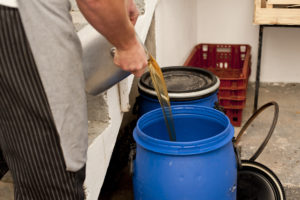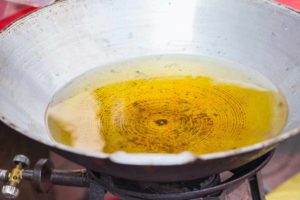We frequently have extra cooking oil after deep-frying, browning ground beef, or cooking bacon. The temptation could be to pour it down the kitchen sink, but doing so might damage the plumbing and harm wildlife if it’s dumped outside on the ground. Cooking oil can be saved for future use, but there are some quick, secure ways to dispose of it if it has gone bad or you no longer want it. It’s a good idea to ask your local solid waste department whether they have any guidelines or rules regarding disposal.
You can keep the cooking oil and use it again if you want to deep fry shortly or frequently fry meals. To remove any debris and crumbs, first, strain the oil through several layers of cheesecloth or a coffee filter. Pour it into an airtight container after that, and keep it there until you’re ready to use it. It’s crucial to remember that you should only repurpose oil once or twice. Before using it, give it a whiff; if it smells bad, throw it out. It’s important to keep in mind that whenever you reuse the oil, the oil loses quality and its smoke point, or the temperature at which it will burn drops.

There are three main indicators that oil shouldn’t be reused: sediment at the oil’s bottom: And oil should not be reused if carefully filtered oil still contains sediment that resembles “charcoal dust.” Although this sediment is evident in oil at ambient temperature, it might not be in cooled oil. Gelatinous substances at the bottom of the oil: Oil that has been adequately filtered and refrigerated is no longer suitable for reusing if it looks to have gelatinous materials at the bottom. This component is most noticeable in cooled oil and is usually found in cooking oils for animal proteins. Odor: If the used oil even slightly stinks, don’t use it again.
Remember that cooking with oil imparts the flavor and aroma of the food it cooks. You wouldn’t necessarily use it to prepare something that is a lot more delicate, or has a much softer flavor or aroma if you were frying fish or onions or something similar. I wouldn’t recommend using oil that I’ve used to cook animal protein if you’re preparing veggies for vegetarians or vegans. Utilizing less oil when cooking is another approach to prevent oil waste.
Use less cooking oil
The best method to develop a healthy way of living is to use less cooking oil. One cautious way to develop a healthy lifestyle is to avoid completely changing your daily schedule at work and home. It is crucial to start small. One single step is simply the beginning of a thousand-mile journey, to paraphrase an old saying. Dealing with your cooking oil is one baby step I suggest. Everyone is now aware of how the high-fat content of regular cooking oil is detrimental to our hearts and cholesterol levels.
Removing the skin from the meat, such as pork and chicken, is one approach to minimize oil. Although the skin is tasty, it also contains a lot of oil, so when it is fried or steamed, much of the oil melts into the broth or sauce. Likewise, try to avoid eating fatty meats like pork chops. Let the oil cool completely before pouring it into a non-recyclable container with a cover and throwing it in the trash if you want to get rid of it. Milk cartons made of cardboard and other similar wax- or plastic-lined paper containers are examples of common non-recyclable containers that function effectively. Other suitable possibilities are Styrofoam and other takeout containers.
Combine with other materials
You can combine the oil with an absorbent substance, such as cat litter, sand, or sawdust, which readily absorbs the liquid, before discarding it. When it’s time to clean out the litter box, save the used container with the old oil and drop it in there before throwing it away. If you frequently fry food, you might want to think about purchasing a package for grease disposal that includes a plastic container and foil-lined bags that can hold up to 32 ounces of oil. Fill a bag with the cooled oil and place it inside the container. Seal the bag once it is full, then dispose of it in the trash.

Contact the oil recycling company
Recycling used cooking oil is the finest solution if you want to take advantage of it. You must find a reputable recycling business in your neighborhood to accomplish this. One of the top businesses providing excellent oil recycling services is NJ Oil Recyclers.
When it comes to disposing of old cooking oil, there are a few no-nos. Never flush toilets or drains with oil. It can clog both your pipes and the sewage mains in the city. A septic system shouldn’t have oil added to it either. It may clog your drainage system and distribution lines, which is worse. Oil-contaminated water is challenging to treat and even impossible. This implies that it may someday contaminate nearby waters.
Pouring hot oil into the trash can attract mice and insects and can also cause problems for garbage trucks and solid waste disposal facilities. Cooking oil should not be disposed of in compost bins or piles. Cooking oil is a form of fat, which is generally bad for compost. Additionally, improper oil disposal can harm your home and invite bugs. By using the right procedures, such as those offered by NJ Oil Recyclers, you can make the most of your cooking oil and get rid of it in a way that’s good for your house, your neighborhood, and the environment.
Some recycling facilities handle used cooking oil so that it can be turned into biodiesel or biogas. If you’re unable to find reliable information about cooking oil recycling just call NJ Oil Recyclers and they will handle the job for you. You won’t need to deal with any mess, their recycling team will do all the work. You just need to hand over the used oil to them.



